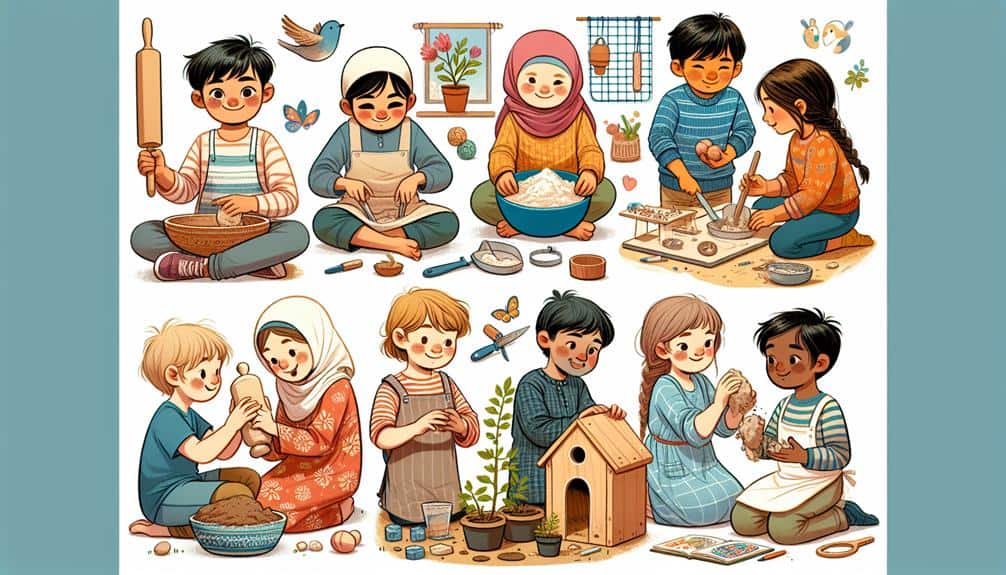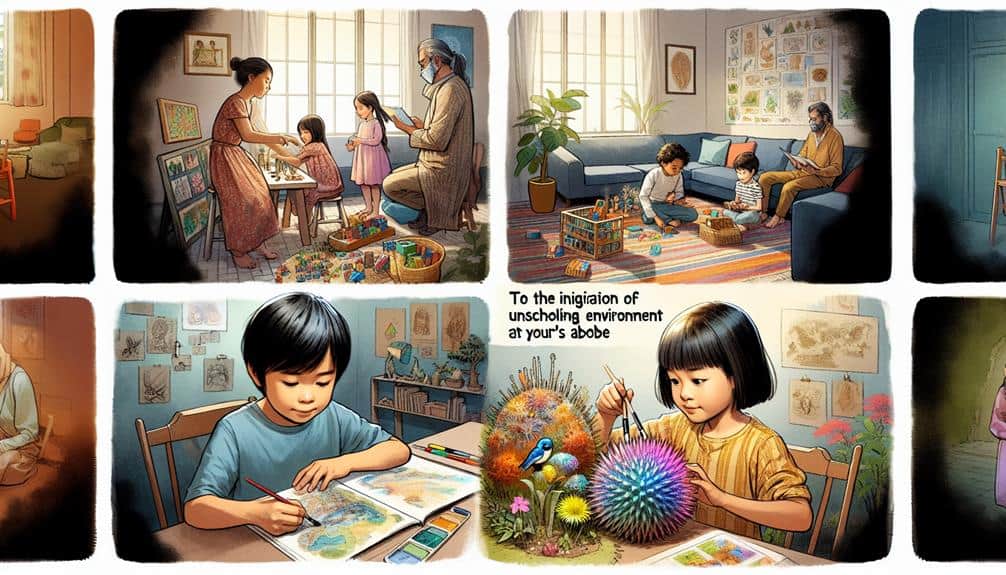Unschooling fosters life skills like independence, creativity, critical thinking, and emotional intelligence through personalized learning and hands-on experiences. It empowers you to develop practical skills such as cooking, budgeting, and organization, leading to responsible, independent living. This approach promotes self-directed learning, nurturing curiosity, resilience, and personal growth. Unschooling also sparks creativity, innovation, and freedom of expression, preparing you for a dynamic world. By promoting critical thinking and social-emotional intelligence, it guarantees a well-rounded education. Uncover how unschooling can shape you into a holistic, well-prepared individual for modern challenges.
Key Points
- Emphasizes practical life skills like cooking and cleaning.
- Teaches budgeting, organization, and time management.
- Encourages self-directed learning for holistic development.
- Fosters creativity and innovation through personalized experiences.
- Promotes social and emotional intelligence for well-rounded individuals.
Benefits of Unschooling Approach
Embracing the unschooling approach can lead to a multitude of benefits for both parents and children, fostering a unique learning experience that prioritizes individual interests and life skills development. One significant advantage is the opportunity for outdoor adventures. Unschooling allows for flexible schedules, giving you the freedom to explore nature and engage in hands-on learning experiences outdoors.
Whether it's hiking in the mountains, observing wildlife in a local park, or conducting science experiments in the backyard, these outdoor adventures not only enrich academic knowledge but also promote physical health and emotional well-being.
Moreover, unschooling nurtures problem-solving skills in children. By following their interests and passions, kids encounter various challenges that require creative solutions. Whether it's figuring out how to build a fort in the woods, designing a new board game, or troubleshooting a science experiment gone awry, unschooled children develop critical thinking, resilience, and adaptability.
These problem-solving skills are invaluable for success in academics, career, and everyday life.
Developing Practical Life Skills
Let's talk about the essential practical life skills that unschooling can help cultivate in you.
Cooking and cleaning are important abilities that can empower you to take care of yourself and your living environment.
Budgeting and organization skills are also essential for managing finances and maintaining a structured lifestyle.
Cooking and Cleaning
Learning to cook and clean is an essential part of developing practical life skills through unschooling. By engaging in meal prep and mastering culinary skills, unschooled individuals gain a valuable understanding of nutrition, food safety, and culinary creativity.
Through household chores and home maintenance tasks, such as cleaning, laundry, and basic repairs, unschoolers learn the importance of maintaining a clean and organized living space.
Cooking allows unschooled individuals to explore different cuisines, experiment with ingredients, and develop a sense of independence in the kitchen. Cleaning teaches them responsibility, time management, and the satisfaction of a tidy environment.
Budgeting and Organization
One essential aspect of developing practical life skills through unschooling is mastering budgeting and organization techniques to effectively manage finances and maintain order in daily routines. Time management is important in balancing responsibilities and leisure activities. By creating schedules and to-do lists, you can prioritize tasks and allocate time wisely.
Saving money is another essential skill to cultivate. Teach yourself or your child the value of budgeting by setting financial goals, tracking expenses, and avoiding unnecessary purchases.
Decluttering your living space not only fosters a sense of organization but also promotes mental clarity. Encourage regular clean-outs of unused items to create a more functional environment.
Meal planning is a practical skill that can save time and money while promoting healthier eating habits. By preparing a weekly menu and shopping list, you can streamline grocery trips and reduce food waste.
Incorporating these budgeting and organization techniques into your unschooling curriculum will equip you or your child with valuable life skills that extend far beyond the educational setting.
Encouraging Self-Directed Learning
You can encourage self-directed learning by fostering an environment that cultivates self-motivated exploration.
This approach allows individuals to take charge of their education, pursuing personalized learning experiences tailored to their interests and strengths.
Self-Motivated Exploration
Encouraging self-motivated exploration in unschooling involves fostering a natural curiosity and independence in children's educational pursuits. By embracing independent study and curiosity-driven learning, unschooling empowers children to investigate topics that genuinely interest them.
Here's how parents can nurture self-motivated exploration:
- Encourage Self-Directed Projects: Provide resources and guidance for children to initiate and complete projects based on their interests. This hands-on approach allows them to take ownership of their learning and develop valuable skills in the process.
- Facilitate Hands-On Experiences: Create opportunities for practical, experiential learning. Whether through field trips, experiments, or real-world applications of knowledge, hands-on experiences deepen understanding and spark curiosity in ways traditional schooling often cannot.
- Foster a Growth Mindset: Celebrate effort, resilience, and learning from mistakes. By instilling a growth mindset, children are more likely to embrace challenges, see failures as opportunities for growth, and remain motivated to explore new horizons in their educational journey.
Personalized Learning Experiences
To foster personalized learning experiences in unschooling, parents can tailor educational approaches to cater to each child's unique interests and learning style. By incorporating hands-on projects and individualized instruction, unschooling allows children to engage in experiential learning with real-world applications. This approach enables children to explore in depth subjects that captivate their curiosity, promoting a deeper understanding and retention of knowledge.
Encouraging self-directed learning through personalized experiences empowers children to take ownership of their education. Parents can observe their child's interests and aptitudes, adapting teaching methods accordingly to maximize learning potential.
Through individualized instruction, children can investigate topics at their own pace, fostering a love for learning that extends beyond traditional classroom settings.
Fostering Creativity and Innovation
Nurturing creativity and fostering innovation are fundamental aspects of the unschooling approach, allowing children to explore and develop their unique talents and ideas. Here are some ways unschooling can help foster creativity and innovation:
- Artistic Expression:
Unschooling provides children with the freedom to engage in various forms of artistic expression. Whether it's painting, music, or creative writing, unschooling allows children to explore their creativity without limitations, nurturing a deep sense of self-expression.
- Problem Solving:
Through unschooling, children are encouraged to tackle problems in their unique ways. This approach fosters innovation by teaching children to think outside the box and come up with creative solutions to challenges they encounter, building essential problem-solving skills for the future.
- Imagination:
Unschooling nurtures children's imaginations by allowing them the time and space to explore and create. This freedom to dream and ideate without boundaries cultivates a sense of wonder and curiosity, laying the foundation for innovative thinking in later life.
Building Critical Thinking Skills
Developing strong critical thinking skills is a cornerstone of the unschooling approach, enabling children to analyze, evaluate, and synthesize information independently. Through unschooling, children are encouraged to engage in activities that foster logical reasoning and problem-solving abilities. Critical thinking involves the ability to assess situations, understand different perspectives, and make informed decisions.
One way unschooling promotes critical thinking is by allowing children the freedom to explore topics that interest them. This freedom encourages curiosity and a natural inclination to question and seek answers.
Additionally, unschooling often incorporates real-life experiences and hands-on learning, providing practical opportunities for children to apply their critical thinking skills in various situations.
Promoting Social and Emotional Intelligence
Encouraging empathy and self-awareness is essential in fostering social and emotional intelligence within unschooling environments. Developing emotional awareness allows individuals to understand and manage their feelings effectively, while nurturing social connections helps in building strong relationships.
Here are three key ways unschooling promotes social and emotional intelligence:
- Emotional Awareness: Unschooling encourages children to recognize and express their emotions in a healthy manner. By acknowledging and understanding their feelings, children can develop the skills needed to navigate various social situations with empathy and resilience.
- Empathy: Through unschooling, children learn to empathize with others by putting themselves in someone else's shoes. This ability to understand and share the feelings of others fosters compassion and promotes positive social interactions.
- Conflict Resolution: Unschooling provides opportunities for children to learn conflict resolution skills. By engaging in open communication, active listening, and negotiation, children can resolve conflicts peacefully and develop effective problem-solving strategies for interpersonal challenges.
Frequently Asked Questions
How Can Unschooling Parents Evaluate Their Child's Academic Progress?
You assess academic progress in various ways: parent assessments, standardized tests, portfolio reviews, and project evaluations. Just as a gardener checks soil quality, sunlight, and plant growth to nurture a garden, you monitor your child's development.
What Resources Are Available for Unschooling Families?
For unschooling families, numerous resources exist to support your journey. Connect with unschooling communities for networking, advice, and shared experiences. Explore online resources for curriculum ideas, educational materials, and virtual support groups.
Can Unschooled Children Transition to Traditional Schooling Easily?
Shifting from unschooling to traditional schooling can be challenging for unschooled children. Academic adjustment, social integration, understanding classroom expectations, and adapting to different learning styles are key areas that may require extra support and guidance.
How Do Unschooling Families Handle Socialization Opportunities?
Handling socialization challenges in unschooling involves active community involvement, encouraging friendships, and engaging in diverse extracurricular activities. By prioritizing social connections and varied experiences, unschooling families create rich environments for holistic development.
What Strategies Can Unschooling Parents Use to Track Their Child's Development?
Wondering how to track your child's development in unschooling? Notice developmental milestones through daily interactions. Regularly observe and assess skills. Keep a portfolio of their work. Review progress periodically to tailor learning experiences effectively.



